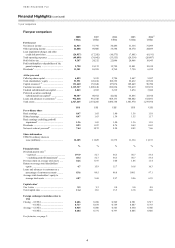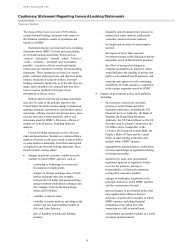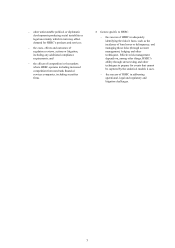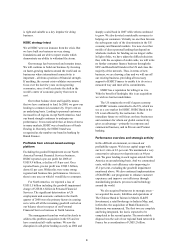HSBC 2008 Annual Report Download - page 16
Download and view the complete annual report
Please find page 16 of the 2008 HSBC annual report below. You can navigate through the pages in the report by either clicking on the pages listed below, or by using the keyword search tool below to find specific information within the annual report.-
 1
1 -
 2
2 -
 3
3 -
 4
4 -
 5
5 -
 6
6 -
 7
7 -
 8
8 -
 9
9 -
 10
10 -
 11
11 -
 12
12 -
 13
13 -
 14
14 -
 15
15 -
 16
16 -
 17
17 -
 18
18 -
 19
19 -
 20
20 -
 21
21 -
 22
22 -
 23
23 -
 24
24 -
 25
25 -
 26
26 -
 27
27 -
 28
28 -
 29
29 -
 30
30 -
 31
31 -
 32
32 -
 33
33 -
 34
34 -
 35
35 -
 36
36 -
 37
37 -
 38
38 -
 39
39 -
 40
40 -
 41
41 -
 42
42 -
 43
43 -
 44
44 -
 45
45 -
 46
46 -
 47
47 -
 48
48 -
 49
49 -
 50
50 -
 51
51 -
 52
52 -
 53
53 -
 54
54 -
 55
55 -
 56
56 -
 57
57 -
 58
58 -
 59
59 -
 60
60 -
 61
61 -
 62
62 -
 63
63 -
 64
64 -
 65
65 -
 66
66 -
 67
67 -
 68
68 -
 69
69 -
 70
70 -
 71
71 -
 72
72 -
 73
73 -
 74
74 -
 75
75 -
 76
76 -
 77
77 -
 78
78 -
 79
79 -
 80
80 -
 81
81 -
 82
82 -
 83
83 -
 84
84 -
 85
85 -
 86
86 -
 87
87 -
 88
88 -
 89
89 -
 90
90 -
 91
91 -
 92
92 -
 93
93 -
 94
94 -
 95
95 -
 96
96 -
 97
97 -
 98
98 -
 99
99 -
 100
100 -
 101
101 -
 102
102 -
 103
103 -
 104
104 -
 105
105 -
 106
106 -
 107
107 -
 108
108 -
 109
109 -
 110
110 -
 111
111 -
 112
112 -
 113
113 -
 114
114 -
 115
115 -
 116
116 -
 117
117 -
 118
118 -
 119
119 -
 120
120 -
 121
121 -
 122
122 -
 123
123 -
 124
124 -
 125
125 -
 126
126 -
 127
127 -
 128
128 -
 129
129 -
 130
130 -
 131
131 -
 132
132 -
 133
133 -
 134
134 -
 135
135 -
 136
136 -
 137
137 -
 138
138 -
 139
139 -
 140
140 -
 141
141 -
 142
142 -
 143
143 -
 144
144 -
 145
145 -
 146
146 -
 147
147 -
 148
148 -
 149
149 -
 150
150 -
 151
151 -
 152
152 -
 153
153 -
 154
154 -
 155
155 -
 156
156 -
 157
157 -
 158
158 -
 159
159 -
 160
160 -
 161
161 -
 162
162 -
 163
163 -
 164
164 -
 165
165 -
 166
166 -
 167
167 -
 168
168 -
 169
169 -
 170
170 -
 171
171 -
 172
172 -
 173
173 -
 174
174 -
 175
175 -
 176
176 -
 177
177 -
 178
178 -
 179
179 -
 180
180 -
 181
181 -
 182
182 -
 183
183 -
 184
184 -
 185
185 -
 186
186 -
 187
187 -
 188
188 -
 189
189 -
 190
190 -
 191
191 -
 192
192 -
 193
193 -
 194
194 -
 195
195 -
 196
196 -
 197
197 -
 198
198 -
 199
199 -
 200
200 -
 201
201 -
 202
202 -
 203
203 -
 204
204 -
 205
205 -
 206
206 -
 207
207 -
 208
208 -
 209
209 -
 210
210 -
 211
211 -
 212
212 -
 213
213 -
 214
214 -
 215
215 -
 216
216 -
 217
217 -
 218
218 -
 219
219 -
 220
220 -
 221
221 -
 222
222 -
 223
223 -
 224
224 -
 225
225 -
 226
226 -
 227
227 -
 228
228 -
 229
229 -
 230
230 -
 231
231 -
 232
232 -
 233
233 -
 234
234 -
 235
235 -
 236
236 -
 237
237 -
 238
238 -
 239
239 -
 240
240 -
 241
241 -
 242
242 -
 243
243 -
 244
244 -
 245
245 -
 246
246 -
 247
247 -
 248
248 -
 249
249 -
 250
250 -
 251
251 -
 252
252 -
 253
253 -
 254
254 -
 255
255 -
 256
256 -
 257
257 -
 258
258 -
 259
259 -
 260
260 -
 261
261 -
 262
262 -
 263
263 -
 264
264 -
 265
265 -
 266
266 -
 267
267 -
 268
268 -
 269
269 -
 270
270 -
 271
271 -
 272
272 -
 273
273 -
 274
274 -
 275
275 -
 276
276 -
 277
277 -
 278
278 -
 279
279 -
 280
280 -
 281
281 -
 282
282 -
 283
283 -
 284
284 -
 285
285 -
 286
286 -
 287
287 -
 288
288 -
 289
289 -
 290
290 -
 291
291 -
 292
292 -
 293
293 -
 294
294 -
 295
295 -
 296
296 -
 297
297 -
 298
298 -
 299
299 -
 300
300 -
 301
301 -
 302
302 -
 303
303 -
 304
304 -
 305
305 -
 306
306 -
 307
307 -
 308
308 -
 309
309 -
 310
310 -
 311
311 -
 312
312 -
 313
313 -
 314
314 -
 315
315 -
 316
316 -
 317
317 -
 318
318 -
 319
319 -
 320
320 -
 321
321 -
 322
322 -
 323
323 -
 324
324 -
 325
325 -
 326
326 -
 327
327 -
 328
328 -
 329
329 -
 330
330 -
 331
331 -
 332
332 -
 333
333 -
 334
334 -
 335
335 -
 336
336 -
 337
337 -
 338
338 -
 339
339 -
 340
340 -
 341
341 -
 342
342 -
 343
343 -
 344
344 -
 345
345 -
 346
346 -
 347
347 -
 348
348 -
 349
349 -
 350
350 -
 351
351 -
 352
352 -
 353
353 -
 354
354 -
 355
355 -
 356
356 -
 357
357 -
 358
358 -
 359
359 -
 360
360 -
 361
361 -
 362
362 -
 363
363 -
 364
364 -
 365
365 -
 366
366 -
 367
367 -
 368
368 -
 369
369 -
 370
370 -
 371
371 -
 372
372 -
 373
373 -
 374
374 -
 375
375 -
 376
376 -
 377
377 -
 378
378 -
 379
379 -
 380
380 -
 381
381 -
 382
382 -
 383
383 -
 384
384 -
 385
385 -
 386
386 -
 387
387 -
 388
388 -
 389
389 -
 390
390 -
 391
391 -
 392
392 -
 393
393 -
 394
394 -
 395
395 -
 396
396 -
 397
397 -
 398
398 -
 399
399 -
 400
400 -
 401
401 -
 402
402 -
 403
403 -
 404
404 -
 405
405 -
 406
406 -
 407
407 -
 408
408 -
 409
409 -
 410
410 -
 411
411 -
 412
412 -
 413
413 -
 414
414 -
 415
415 -
 416
416 -
 417
417 -
 418
418 -
 419
419 -
 420
420 -
 421
421 -
 422
422 -
 423
423 -
 424
424 -
 425
425 -
 426
426 -
 427
427 -
 428
428 -
 429
429 -
 430
430 -
 431
431 -
 432
432 -
 433
433 -
 434
434 -
 435
435 -
 436
436 -
 437
437 -
 438
438 -
 439
439 -
 440
440 -
 441
441 -
 442
442 -
 443
443 -
 444
444 -
 445
445 -
 446
446 -
 447
447 -
 448
448 -
 449
449 -
 450
450 -
 451
451 -
 452
452 -
 453
453 -
 454
454 -
 455
455 -
 456
456 -
 457
457 -
 458
458 -
 459
459 -
 460
460 -
 461
461 -
 462
462 -
 463
463 -
 464
464 -
 465
465 -
 466
466 -
 467
467 -
 468
468 -
 469
469 -
 470
470 -
 471
471 -
 472
472
 |
 |

HSBC HOLDINGS PLC
Report of the Directors: Operating and Financial Review (continued)
Challenges and uncertainties
14
presenting challenges to HSBC which are specific
to those areas.
Europe
In the UK, the economy has entered recession and
the currency has fallen in value against the US
dollar, the yen and the euro. Changes in the
marketplace are emerging following the part-
nationalisation of some major financial institutions,
and political interaction with the regulatory
environment is becoming more frequent as the
government seeks to stimulate lending to preserve
economic activity. A period of low interest rates will
reduce deposit spreads and HSBC’s retail business
model will be more dependent on transactional fees
and lending margin. Pension funding requirements,
in particular for UK defined benefit schemes, will
place increased financing demands on corporates,
which may lead to unfunded commitments being
drawn down, adding to pressure on system liquidity.
The recent deterioration in credit quality is expected
to continue as the economy contracts, with loan
impairment charges rising as a result. Market
volatility is also expected to continue.
In France, changes in the marketplace are slowly
emerging following government measures to
stimulate lending and preserve economic activity. A
period of low interest rates will not adversely impact
spreads in the short-term but will have an adverse
effect in later years. HSBC’s retail business model is
dependent on banking fees to maintain profitability
and a recovery in financial markets is necessary in
order to enhance brokerage and management fees
and stimulate fund management activities.
Deterioration in credit quality is expected to
continue as the economy contracts, with commercial
loan impairment charges rising as a result. Personal
loan impairment charges are expected to remain at
around current levels unless there is a very deep
recession.
Conditions are likely to remain difficult in a
number of markets in which HSBC currently trades
and volatility is expected to continue.
Hong Kong and Rest of Asia-Pacific
In Asia-Pacific, a prolonged period of low interest
rates is expected which will put pressure on HSBC’s
net interest income from its strong deposit base.
With capital market and currency volatility endemic,
customers are likely to seek capital protection and
become increasingly rate and risk sensitive, seeking
out products which offer deposit insurance and
government guarantees. Regulatory reforms in the
areas of wealth management product complexity,
sales requirements and liquidity and reserve ratios
are likely, and these will lead to a higher cost of
compliance, greater standardisation and slower
product approvals. International trade is expected to
continue to contract, affecting import and export
volumes and reducing HSBC’s earnings from trade
financing. The quality of the asset book will
deteriorate if economic factors beyond HSBC’s
control do not improve, reducing customer credit
ratings and, as a consequence, increasing risk-
weighted asset allocations and capital requirements.
This could be exacerbated if capital continues to be
repatriated from emerging markets to more
developed economies to take advantage of lower
asset prices, adversely affecting emerging markets’
balance of payments and foreign exchange reserves.
However, Asia is expected to adapt quickly to secure
recovery from the global recession, led by mainland
China and India.
The fall in global demand for oil products and
related prices, and the contraction in financial
surpluses held by key oil-producing countries
following the declines in capital markets, will reduce
the ability of some countries in the Middle East to
maintain spending, borrowing and investment
domestically and internationally. This will result in
the cancellation or postponement of infrastructure
projects which, together with weakening property
prices, is expected to reduce both credit cover and
revenue streams for financial institutions. The
availability of economically priced, long-term
funding is likely to contract. Business activity and
private investment will also slow as consumer
confidence declines. These factors will combine to
place pressure on net revenues and on capital
requirements.
North America
In the US, the steep decline in the housing market,
with falling home prices and increasing foreclosures,
and rising unemployment have resulted in significant
write-downs of loans and advances and mortgage-
backed securities. The effect of these write-downs
subsequently spread to other capital market
activities, leading many financial institutions to seek
additional capital, merge with larger and stronger
institutions and, in some cases, fail. Many lenders
reduced or stopped providing funding to borrowers,
including to other financial institutions. This market
turmoil and resultant tightening of credit have led to
an increased level of delinquencies, a fall in
consumer confidence, increased market volatility
and a widespread reduction in business activity in
general. To date, various government intervention
measures designed to stabilise the markets, including
